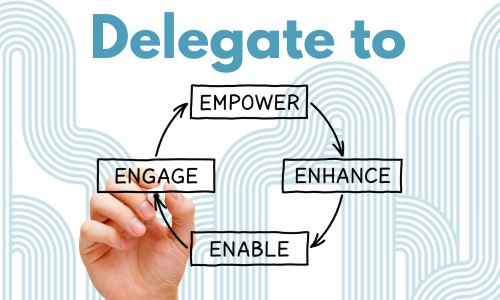One of the most common challenges that comes up in executive coaching is delegation. It’s not that leaders don’t want to delegate — it’s that so many don’t know how to stop doing.
And it makes sense. We’ve spent our entire lives being rewarded for doing the work. We earned good grades by turning in our own assignments. We landed our first jobs and promotions because we were reliable doers. We developed deep subject matter expertise by executing tasks at a high level. And for many, the more we did, the more we were rewarded.But somewhere along the way — typically around the time someone becomes a people leader — the rules change. Unfortunately, no one tells us that. And so we keep doing.
The truth is, once you step into leadership, your value is no longer in how much you can accomplish — it’s in how well you empower others to succeed.
As a leader, you become a “Chief Inspiration Officer.” Your primary role isn’t to be the expert in the work — it’s to understand the bigger picture, listen to your team, and remove barriers so they can thrive. You lead by aligning and influencing others around purpose, strategy, and outcomes — not by micromanaging how every task gets done.
And this shift isn’t just personal — it’s cultural. Delegation is how leadership capacity grows across the organization. It’s how high-performing teams build trust, own decisions, and develop confidence. When done well, delegation strengthens your leadership pipeline and shapes a culture of empowerment.
Fail to make this shift, and it shows. Tasks pile up at the top. Teams hesitate to move without approval. Decision-making slows. High-potential employees disengage. Not delegating doesn’t just impact productivity — it limits the organization’s ability to scale.
A recent Harvard Business Review article on delegation offers some helpful reminders. It notes that many leaders hesitate to delegate because:
- They fear burdening others.
- They believe no one can do it as well as they can.
- They want to maintain control or perfection.
- They don’t think they have time to teach someone else.
Sound familiar?
Here’s the mindset shift:
Delegation is not about giving away tasks. It’s about influencing and growing people. It’s not just a time management strategy — it’s a leadership strategy.
When you delegate effectively, you send a powerful signal to your team: I trust you. I believe in your potential. I want to see you grow. And that’s what true leadership is about.
So how do you make the shift from doer to leader? Here are five essential strategies:
- Lead through inspiration, not execution
Your team doesn’t need you to be the smartest person in the room — they need you to set vision, create clarity, and rally them around purpose. Let your presence elevate performance, not control it. - Delegate decision-making authority
True delegation goes beyond task assignment — it includes ownership. Empower others to make decisions, take risks, and learn. This not only builds trust, it accelerates leadership growth within your team. - Coach, don’t rescue
It’s tempting to step in and fix things. Instead, ask questions, offer guidance, and let your team problem-solve. Coaching develops capability and fosters resilience. - Start small
Begin with clear, low-risk tasks. Provide clear expectations, set check-ins, and celebrate progress. This builds confidence on both sides — theirs and yours. - Celebrate growth, not perfection
Don’t just recognize flawless execution — celebrate learning, ownership, and momentum. Highlight team wins you enabled, not controlled. That’s what lasting leadership looks like.
Delegation isn’t about doing less. It’s about achieving more through others. And that’s the kind of leadership we believe today’s organizations need most.
